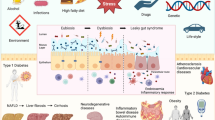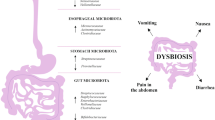Abstract
Eicosanoids are major mediators of defensive and inflammatory processes of the gut mucosa. The activity of the eicosanoid system is modulated by neural and hormonal pathways, but local factors acting within the gastrointestinal lumen may also be involved. We have studied the influence of dietary fatty acids on eicosanoid synthesis by the gastrointestinal mucosa. Since omega-3 fatty acids compete with the omega-6 as precursors of eicosanoid synthesis, we compared the effects of dietary supplementation with either sunflower or cod liver oil as sources of omega-6 or omega-3 fatty acids, respectively. Rats fed with the codliver-oil-supplemented diet for four weeks showed high omega-3 and low omega-6 plasma fatty acid levels compared to rats fed with the sunflower oil diet. Synthesis of arachidonic-acid-derived eicosanoids (6-keto-PGF1α, PGE2, TXB2, LTB4, and LTC4) by gastric and intestinal mucosa was found to be lower in the cod liver group as compared to the sunflower group. However, significant generation of eicosapentaenoic-acid-derived ecosanoids (PGE3 and LTC5) was observed only in the cod liver group.
We used the (trinitrobenzenesulphonic acid) TNBS model of inflammatory colitis to test the effect of the dietary fat on the development of inflammatory lesions of the bowel. A single intracolonic instillation of the hapten TNBS dissolved in 10% ethanol induces chronic granulomatous lesions of the colonic mucosa that persist for up to 8 weeks. Luminal release of eicosanoid mediators, as measured by intracolonic dialysis, was lower in the cod liver group than in the sunflower group, particularly during the chronic stage of the disease. Macroscopical and microscopical assessment of the lesions, serially performed for up to 8 weeks, showed significant differences between both groups, suggesting that the fish oil diet diminishes the severity of the lesions and their progression to chronicity. In conclusion, changes in the pattern of eicosanoid synthesis by the gastrointestinal mucosa can be induced by altering the dietary intake of their fatty acid precursors. These changes may be relevant for the expression of disease.
Similar content being viewed by others
References
C. J. Hawkey and D. S. Rampton,Prostaglandins and the gastrointestinal mucosa: Are they important in its function, disease or treatment? Gastroenterology89, 1162–1188 (1985).
H. W. Grant, K. R. Palmer, R. W. Kelly, N. H. Wilson and J. J. Misiewicz,Dietary linoleic acid, gastric acid, and prostaglandin secretion. Gastroenterology94, 955–959 (1988).
P. Prichard, G. Brown, N. Bhaskar and C. Hawkey,The effect of dietary fatty acids on the gastric production of prostaglandins and aspirin-induced injury. Aliment. Pharmacol. Therap.2, 179–184 (1988).
W. Schepp, B. Steffen, H. J. Ruoff, V. Schusdziarra and M. Classen,Modulation of rat gastric mucosal prostaglandin E 2 release by dietary linoleic acid: Effects on gastric acid secretion and stress-induced mucosal damage. Gastroenterology95, 18–25 (1988).
T. H. Lee, R. L. Hoover and J. D. Williams,Effect of dietary enrichment with eicosapentaenoic and docosahexaenoic acids on in vitro neutrophil and monocyte leukotriene generation and neutrophil function. New Engl. J. Med.312, 1217–1224 (1985).
S. Endres, R. Ghorbani and V. E. Kelley,The effect of dietary supplementation with omega-3 polyunsaturated fatty acids on the synthesis of interleukin-1 and tumor necrosis factor by mononuclear cells. New Engl. J. Med.320, 265–271 (1989).
P. Needleman, A. Raz, M. S. Minkes, J. A. Ferrendeli and H. Sprecher,Trieneprostaglandins: Prostacyclin and thromboxane biosynthesis and unique biological properties. Proc. Natl. Acad. Sci. USA76, 944–948 (1979).
T. Terano, J. A. Salmon and S. Moncada,Biosynthesis and biological activity of leukotriene B 5. Prostaglandins27, 217–232 (1984).
N. K. Boughton-Smith and B. J. R. Whittle,Inhibition of gastric acid secretion in the rat by prostaglandins derived from arachidonic acid or eicosapentaenoic acid. Gastroenterology98, A24 (1990).
R. Rodriguez, M. Martinez, F. Guarner and J. R. Malagelada,Modification of gut mucosal eicosanoid synthesis by a fish oil diet. J. Clin. Nutr. Gastroenterol.5 11–19 (1990).
J. Vilaseca, A. Salas, F. Guarner, R. Rodriguez, M. Martinez and J. R. Malagelada,Dietary fish oil reduces progression of chronic inflammatory lesions in a rat model of colitis. Gut31, 539–544 (1990).
G. P. Morris, P. L. Beck, M. S. Herridge, W. T. Depew, M. R. Szewezuk and J. L. Wallace,Hapten-induced model of chronic inflammation and ulceration in the rat colon. Gastroenterology96, 795–803 (1989).
J. Vilaseca, A. Salas, F. Guarner, R. Rodríguez and J. R. Malagelada,Participation of thromboxane and other eicosanoid synthesis in the course of experimental colitis. Gastroenterology98, 269–277 (1990).
F. Guarner, J. Vilaseca, A. Salas, R. Rodríguez and J. R. Malagelada,Reduction of cysteamine-induced duodenal ulcers by dietary fish oil. Eur. J. Gastroenterol. Hepatol.3, 239–243 (1991).
Author information
Authors and Affiliations
Rights and permissions
About this article
Cite this article
Guarner, F., Vilaseca, J. & Malagelada, J.R. Dietary manipulation in experimental inflammatory bowel disease. Agents and Actions 36, C10–C14 (1992). https://doi.org/10.1007/BF01996088
Issue Date:
DOI: https://doi.org/10.1007/BF01996088




